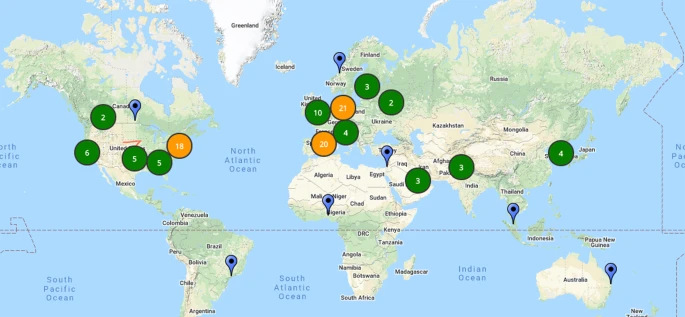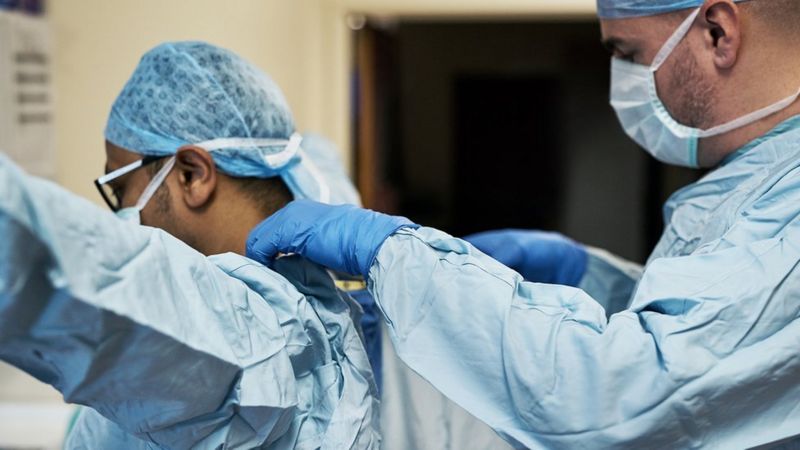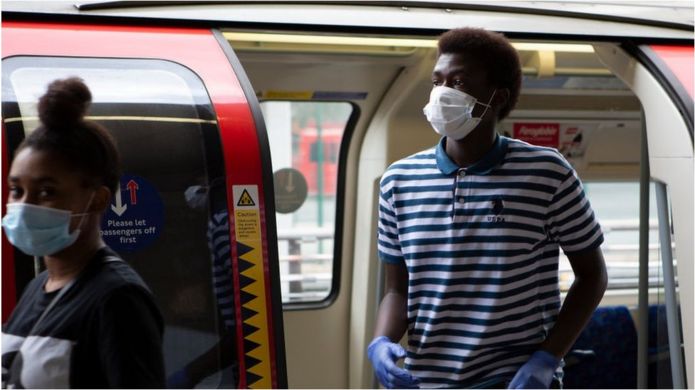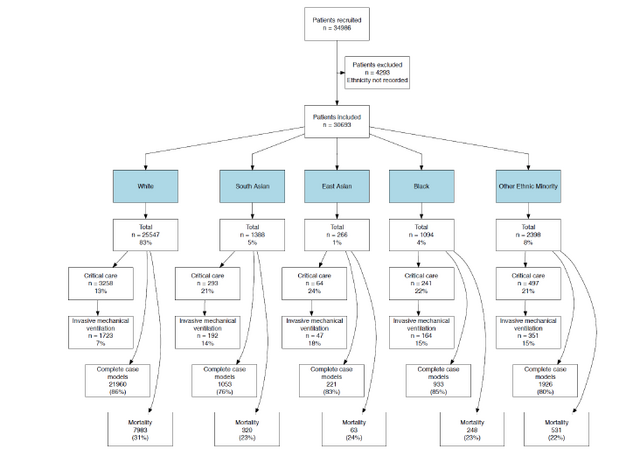Post by Admin on Jun 20, 2020 2:20:05 GMT
The scientists opted for a GWAS methodology, in which common variants in a number of individuals, both without the disease (control groups) and with the disease (COVID-19 patients) are explored using arrays. Through this approach, genetic variants that are associated with the disease will be found at a higher frequency than in the control groups.
When COVID-19 reached a peak in Italy and Spain earlier in 2020, the research team recruited 835 patients and 1255 control participants from Italy and 775 patients and 950 control participants from Spain for the study.
In the patient cohort, a confirmed SARS-CoV-2 viral RNA polymerase-chain-reaction (PCR) test collected from nasopharyngeal swabs or alternative biologic fluids was required. Respiratory failure was defined in a simplistic manner as the use of oxygen supplementation or mechanical ventilation, and severity was graded according to the maximum respiratory support received at any one point during hospitalization. The COVID-19 participants were recruited from various hospitals across Spain and Italy.
The 2381 control participants were recruited from either blood donor banks or previous genotyping studies that had adopted the same array method.

Two genetic variants associated with COVID-19 respiratory failure
From the data, the scientists discovered two independent gene variants that appear to be associated with COVID-19 induced respiratory failure: rs11385942 at locus 3p21.31 and rs657152 at locus 9q34.2 – these were significant at the genome wide level (P<5×10−8).
Looking closer at chromosome 3p21.31, the peak association signal encompassed a cluster of six genes: SLC6A20, LZTFL1, CCR9, FYCO1, CXCR6, and XCR1. Whilst a causative gene cannot be drawn reliably from the current data, the authors highlighted SLC6A20 in the paper, a gene which encodes a transporter that interacts with the angiotensin-converting enzyme 2, the SARS-CoV-2 cell-surface receptor. The researchers also emphasize that these results align with those of the COVID-19 Host Genetics Consortium, whose preliminary data also suggest associations with the same locus at chromosome 3p21.31.
In the paper, the authors note: "It seems reasonable to conclude that the chromosome 3p21.31 locus is involved in Covid-19 [COVID-19] susceptibility per se, with a possible enrichment in patients with severe disease."
It's important to note that GWAS studies do not demonstrate a causal role for a specific genetic variant – rather, it points to associations. Commenting on the study, Dr Sakthivel Vaiyapuri, Associate Professor in Cardiovascular & Venom Pharmacology, University of Reading, said, "This is a high quality study on GWAS in relation to COVID-19. While a GWAS study is able to identify specific genes associated with COVID-19 in the wider population, it doesn’t link with the mechanistic details behind the disease progression or protection."
The potential role of blood type in COVID-19 susceptibility
A number of studies have pointed to the potential role that an individual's blood group may have on their susceptibility to COVID-19. To date, this has not been confirmed without reasonable doubt. However, data from this work suggests that further exploration of this potential factor is warranted.
The team found that the association signal at locus 9q34.2 coincided with the ABO blood group locus. A blood-group-specific analysis also demonstrated a higher risk in blood group A compared to other blood groups (P=1.48×10−4) in addition to a protective effect in blood group O when compared to other blood groups (P=1.06×10−5).
Sakthivel says: "This study doesn’t draw any strong conclusions about how different blood types may make someone susceptible or protective for COVID-19. They are only suggesting that they have identified genes in ABO blood group region and suggest that these might relate to someone’s susceptibility or protective nature based on their blood types."
Working under pressure during a global pandemic
The authors note that this research study performed at a critical time was a major undertaking, and as such, it is not without flaws.
For example, to enable fast and extensive recruitment of study participants, a bare minimum of clinical metadata was requested, the authors state in the paper. They add "For this reason, extensive genotype–phenotype elaboration of current findings could not be conducted, and adjustments for all potential sources of bias (e.g., underlying cardiovascular and metabolic factors relevant to Covid-19) could not be performed. Furthermore, we have limited information about the SARS-CoV-2 infection status in the control participants."
"People with A blood group should not panic about these results, and at the same time O blood group people should not be relaxed because they may not get this disease. Everyone should follow the guidelines provided by the health authorities and be extremely cautious to protect themselves and others around them." - Dr Sakthivel Vaiyapuri, Associate Professor in Cardiovascular & Venom Pharmacology, University of Reading.
References:
1. Ellinghaus et al. (2020). Genomewide Association Study of Severe Covid-19 with Respiratory Failure. The New England Journal of Medicine. DOI: 10.1056/NEJMoa2020283.
2. COVID-19 Host Genetics Initiative. (2020). The COVID-19 Host Genetics Initiative, a global initiative to elucidate the role of host genetic factors in susceptibility and severity of the SARS-CoV-2 virus pandemic. European Journal of Human Genetics. DOI: doi.org/10.1038/s41431-020-0636-6.
When COVID-19 reached a peak in Italy and Spain earlier in 2020, the research team recruited 835 patients and 1255 control participants from Italy and 775 patients and 950 control participants from Spain for the study.
In the patient cohort, a confirmed SARS-CoV-2 viral RNA polymerase-chain-reaction (PCR) test collected from nasopharyngeal swabs or alternative biologic fluids was required. Respiratory failure was defined in a simplistic manner as the use of oxygen supplementation or mechanical ventilation, and severity was graded according to the maximum respiratory support received at any one point during hospitalization. The COVID-19 participants were recruited from various hospitals across Spain and Italy.
The 2381 control participants were recruited from either blood donor banks or previous genotyping studies that had adopted the same array method.

Two genetic variants associated with COVID-19 respiratory failure
From the data, the scientists discovered two independent gene variants that appear to be associated with COVID-19 induced respiratory failure: rs11385942 at locus 3p21.31 and rs657152 at locus 9q34.2 – these were significant at the genome wide level (P<5×10−8).
Looking closer at chromosome 3p21.31, the peak association signal encompassed a cluster of six genes: SLC6A20, LZTFL1, CCR9, FYCO1, CXCR6, and XCR1. Whilst a causative gene cannot be drawn reliably from the current data, the authors highlighted SLC6A20 in the paper, a gene which encodes a transporter that interacts with the angiotensin-converting enzyme 2, the SARS-CoV-2 cell-surface receptor. The researchers also emphasize that these results align with those of the COVID-19 Host Genetics Consortium, whose preliminary data also suggest associations with the same locus at chromosome 3p21.31.
In the paper, the authors note: "It seems reasonable to conclude that the chromosome 3p21.31 locus is involved in Covid-19 [COVID-19] susceptibility per se, with a possible enrichment in patients with severe disease."
It's important to note that GWAS studies do not demonstrate a causal role for a specific genetic variant – rather, it points to associations. Commenting on the study, Dr Sakthivel Vaiyapuri, Associate Professor in Cardiovascular & Venom Pharmacology, University of Reading, said, "This is a high quality study on GWAS in relation to COVID-19. While a GWAS study is able to identify specific genes associated with COVID-19 in the wider population, it doesn’t link with the mechanistic details behind the disease progression or protection."
The potential role of blood type in COVID-19 susceptibility
A number of studies have pointed to the potential role that an individual's blood group may have on their susceptibility to COVID-19. To date, this has not been confirmed without reasonable doubt. However, data from this work suggests that further exploration of this potential factor is warranted.
The team found that the association signal at locus 9q34.2 coincided with the ABO blood group locus. A blood-group-specific analysis also demonstrated a higher risk in blood group A compared to other blood groups (P=1.48×10−4) in addition to a protective effect in blood group O when compared to other blood groups (P=1.06×10−5).
Sakthivel says: "This study doesn’t draw any strong conclusions about how different blood types may make someone susceptible or protective for COVID-19. They are only suggesting that they have identified genes in ABO blood group region and suggest that these might relate to someone’s susceptibility or protective nature based on their blood types."
Working under pressure during a global pandemic
The authors note that this research study performed at a critical time was a major undertaking, and as such, it is not without flaws.
For example, to enable fast and extensive recruitment of study participants, a bare minimum of clinical metadata was requested, the authors state in the paper. They add "For this reason, extensive genotype–phenotype elaboration of current findings could not be conducted, and adjustments for all potential sources of bias (e.g., underlying cardiovascular and metabolic factors relevant to Covid-19) could not be performed. Furthermore, we have limited information about the SARS-CoV-2 infection status in the control participants."
"People with A blood group should not panic about these results, and at the same time O blood group people should not be relaxed because they may not get this disease. Everyone should follow the guidelines provided by the health authorities and be extremely cautious to protect themselves and others around them." - Dr Sakthivel Vaiyapuri, Associate Professor in Cardiovascular & Venom Pharmacology, University of Reading.
References:
1. Ellinghaus et al. (2020). Genomewide Association Study of Severe Covid-19 with Respiratory Failure. The New England Journal of Medicine. DOI: 10.1056/NEJMoa2020283.
2. COVID-19 Host Genetics Initiative. (2020). The COVID-19 Host Genetics Initiative, a global initiative to elucidate the role of host genetic factors in susceptibility and severity of the SARS-CoV-2 virus pandemic. European Journal of Human Genetics. DOI: doi.org/10.1038/s41431-020-0636-6.





